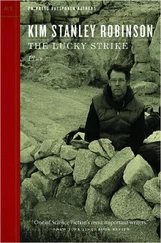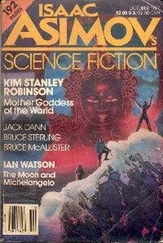Then they reach a pitch where the fixed rope has been cut in the middle. Falling rock or ice has shaved it off. A bad sign. Now Roger must climb a ropeless pitch, hammering in pitons on his way to protect himself. Every meter above the last belay is a two-meter fall. . .
Roger never expected so hard a climb, and adrenaline banishes his exhaustion. He studies the first small section of a pitch that he knows is ten or twelve meters long, invisible in the dark snow flurries above. Probably Marie or Dougal climbed this crack the first time. He discovers that the crack just gives him room for his hands. Almost a vertical crack for a while, with steps cut into the ice. Up he creeps, crablike and surefooted. Now the crack widens and the ice is too far back in it to be of use—but the cramponed boots can be stuck in the crack and turned sideways, to stick tenuously into the thin ice coating the crack’s interior. One creates one’s own staircase, mostly using the tension of the twisted crampons. Now the crack abruptly closes and he has to look around, ah, there, a horizontal crack holding the empty piton. Very good—he hooks into it and is protected thus far. Perhaps the next piton is up the rampway to the right? Clawing to find the slight indentations that pass for handholds, crouching to lean up the ramp in a tricky walk—he wonders about the crampons here . . . ah. The next piton, right at eye level. Perfect. And then an area lined with horizontal strata about a meter in thickness, making a steep—a very steep—ladder.
And at the top of that pitch they find that the high-camp tent has been crushed under a load of snow. Avalanche. One corner of the tent flaps miserably.
Eileen comes up and surveys the damage in the double glare of their two headlamps. She points at the snow, makes a digging motion. The snow is so cold that it can’t bind together—moving it is like kicking coarse sand. They get to work, having no other choice. Eventually the tent is free, and as an added benefit they are warmed as well, although Roger feels he can barely move. The tent’s poles have been bent and some broken, and splints must be tied on before the tent can be redeployed. Roger kicks snow and ice chunks around the perimeter of the tent, until it is “certifiably bombproof,” as the leads would say. Except if another avalanche hits it, something they can’t afford to think about, as they can’t move the camp anywhere else. They simply have to risk it. Inside, they drop their packs and start the stove and put a pot of ice on. Then crampons off, and into sleeping bags. With the bags around them up to the waist, they can start sorting out the mess. There is spindrift on everything, but unless it gets right next to the stove it will not melt. Digging in the jumbled piles of gear for a packet of stew, Roger feels again how tired his body is. Oxygen masks off, so they can drink. “That was quite an excursion.” Raging thirst. They laugh with relief. He brushes an unused pot with his bare hand, guaranteeing a frostnip blister. Eileen calculates the chance of another avalanche without visible trepidation: “. . . so if the wind stays high enough we should be okay.” They discuss Stephan, and sniff like hunting dogs at the first scent of the stew. Eileen digs out the radio and calls down to the low camp. Stephan is sleeping, apparently without discomfort. “Morphine will do that,” Eileen says. They wolf down their meal in a few minutes.
The snow under the tent is torn up by boot prints, and Roger’s sleeping surface is unbelievably lumpy. He rolls over until he is wedged against the length of Eileen’s bag, coveting the warmth and hoping for a flatter surface. It is just as lumpy there. Eileen snuggles back into him and he can feel the potential for warmth; he can tell he will warm up. He wonders if getting into one bag would be worth the effort.
“Amazing what some people will do for fun,” Eileen comments drowsily.
Short laugh. “This isn’t the fun part.”
“Isn’t it? That climb . . .”
Big yawn. “That was some climb,” he agrees. No denying it.
“That was a great climb.”
“Especially since we didn’t get killed.”
“Yeah.” She yawns too, and Roger can feel a big wave of sleep about to break over him and sweep him away. “I hope Stephan gets better. Otherwise, we’ll have to take him down.”
In the next few days everyone has to go out several times in the storm, to keep the high camp supplied and to keep the fixed ropes free of ice. The work is miserable when they can do it, and sometimes they can’t: The wind on some days shuts down everything, and they can only huddle inside and hope the tents hold to the face. One dim day Roger is sitting with Stephan and Arthur in low camp. Stephan has recovered from the edema, and is anxious to climb again. “No hurry,” Roger says. “No one’s going anywhere anyway, and water in the lungs is serious business. You’ll have to take it slow—”
The tent door is unzipped and a plume of snow enters, followed by Dougal. He grins hello. The silence seems to call for some comment. “Pretty invigorating out there,” he says to fill it, and looks after a pot of tea. The shy moment having passed he chats cheerfully with Arthur about the weather. Tea done, he is off again; he is in a hurry to get a load up to the high camp. A quick grin and he is out the tent and gone. And it occurs to Roger that there are two types of climbers on their expedition (another duality): those who endure the bad weather and accidents and all the various difficulties of the face that are making this climb so uncomfortable, and those who, in some important peculiar way, enjoy all the trouble. In the former group are Eileen, who has the overriding responsibility for the climb—Marie, who is in such a hurry for the top—and Hans and Stephan, who are less experienced and would be just as happy to climb under sunny skies and with few serious difficulties. Each of these is steady and resolute, without a doubt; but they endure.
Dougal, on the other hand, Dougal and Arthur: Those two are quite clearly enjoying themselves, and the worse things get the more fun they seem to have. It is, Roger thinks, perverse. The reticent, solitary Dougal, seizing with quiet glee every possible chance to get out into the gale and climb. . . . “He certainly seems to be enjoying himself,” Roger says out loud, and Arthur laughs.
“That Dougal!” he cries. “What a Brit he is. You know climbers are the same everywhere. I come all the way to Mars and find just the people you’d expect to find on Ben Nevis. ’Course it stands to reason, doesn’t it? That New Scotland school and all.”
It is true; from the very start of the colonization, British climbers have been coming to Mars in search of new climbs, and many of them have stayed.
“And I’ll tell you,” Arthur continues, “those guys are never happier than when it’s blowing force ten and dumping snow by the dump truck. Or not snow, actually. More like sleet, that’s what they want. One degree rain, or wet snow. Perfect. And you know why they want it? So they can come back in at the end of the day and say, ‘Bloody desperate out today, eh mate?’ They’re all dying to be able to say that. ‘Bluidy das perate, mite.’ Ha! Do you know what I mean? It’s like giving themselves a medal or something, I don’t know.”
Roger and Stephan, smiling, nod. “Very macho,” Stephan says.
“But Dougal!” Arthur cries. “Dougal! He’s too cool for that. He goes out there in the nastiest conditions he can possibly find—I mean look at him just now—he couldn’t wait to get back out there! Didn’t want to waste such a fine opportunity! And he climbs the hardest pitches he can find too. Have you seen him? You’ve seen the routes he leaves behind. Man, that guy could climb buttered glass in a hurricane. And what does he say about it? Does he say that was pretty bloody desperate? No! He says,” and Roger and Stephan join in, like a chorus: “How invigorating!”
Читать дальше
Конец ознакомительного отрывка
Купить книгу












